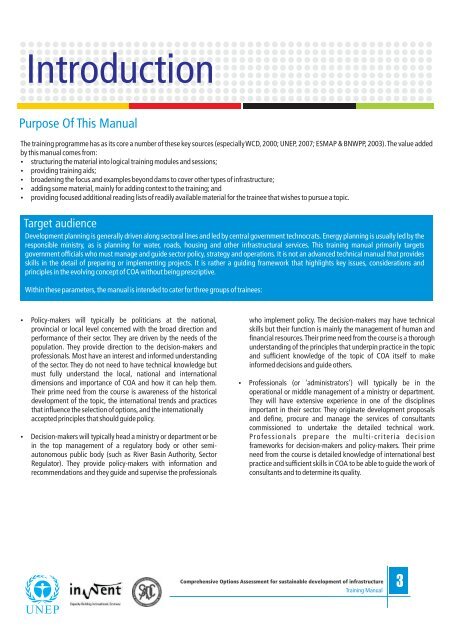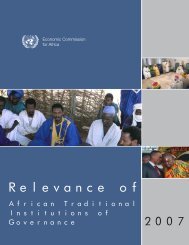Comprehensive Option Assesment - UNEP
Comprehensive Option Assesment - UNEP
Comprehensive Option Assesment - UNEP
Create successful ePaper yourself
Turn your PDF publications into a flip-book with our unique Google optimized e-Paper software.
Introduction<br />
Purpose Of This Manual<br />
The training programme has as its core a number of these key sources (especially WCD, 2000; <strong>UNEP</strong>, 2007; ESMAP & BNWPP, 2003). The value added<br />
by this manual comes from:<br />
structuring the material into logical training modules and sessions;<br />
providing training aids;<br />
broadening the focus and examples beyond dams to cover other types of infrastructure;<br />
adding some material, mainly for adding context to the training; and<br />
providing focused additional reading lists of readily available material for the trainee that wishes to pursue a topic.<br />
Target audience<br />
Development planning is generally driven along sectoral lines and led by central government technocrats. Energy planning is usually led by the<br />
responsible ministry, as is planning for water, roads, housing and other infrastructural services. This training manual primarily targets<br />
government officials who must manage and guide sector policy, strategy and operations. It is not an advanced technical manual that provides<br />
skills in the detail of preparing or implementing projects. It is rather a guiding framework that highlights key issues, considerations and<br />
principles in the evolving concept of COA without being prescriptive.<br />
Within these parameters, the manual is intended to cater for three groups of trainees:<br />
Policy-makers will typically be politicians at the national,<br />
provincial or local level concerned with the broad direction and<br />
performance of their sector. They are driven by the needs of the<br />
population. They provide direction to the decision-makers and<br />
professionals. Most have an interest and informed understanding<br />
of the sector. They do not need to have technical knowledge but<br />
must fully understand the local, national and international<br />
dimensions and importance of COA and how it can help them.<br />
Their prime need from the course is awareness of the historical<br />
development of the topic, the international trends and practices<br />
that influence the selection of options, and the internationally<br />
accepted principles that should guide policy.<br />
Decision-makers will typically head a ministry or department or be<br />
in the top management of a regulatory body or other semiautonomous<br />
public body (such as River Basin Authority, Sector<br />
Regulator). They provide policy-makers with information and<br />
recommendations and they guide and supervise the professionals<br />
who implement policy. The decision-makers may have technical<br />
skills but their function is mainly the management of human and<br />
financial resources. Their prime need from the course is a thorough<br />
understanding of the principles that underpin practice in the topic<br />
and sufficient knowledge of the topic of COA itself to make<br />
informed decisions and guide others.<br />
Professionals (or 'administrators') will typically be in the<br />
operational or middle management of a ministry or department.<br />
They will have extensive experience in one of the disciplines<br />
important in their sector. They originate development proposals<br />
and define, procure and manage the services of consultants<br />
commissioned to undertake the detailed technical work.<br />
Professionals prepare the multi-criteria decision<br />
frameworks for decision-makers and policy-makers. Their prime<br />
need from the course is detailed knowledge of international best<br />
practice and sufficient skills in COA to be able to guide the work of<br />
consultants and to determine its quality.<br />
<strong>Comprehensive</strong> <strong>Option</strong>s Assessment for sustainable development of infrastructure<br />
Training Manual<br />
3
















